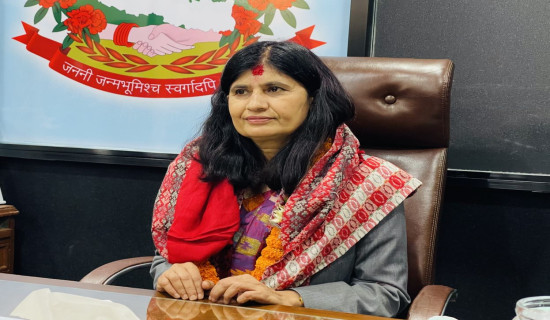- Sunday, 31 August 2025
Cannabis Legalisation Risks And Advantages
Cannabis has recently acquired popularity all around the world as several countries have legalised its cultivation and medicinal usage, while others have made it available for recreational purposes.
In Nepal, the argument over whether the crop, whose cultivation and usage have been illegal for over five decades, has gained traction after countries such as the United States and a handful of nations in Europe, South America, Australia and Asia permitted it to be used for therapeutic and recreational purposes.
The Finance Minister, Prakash Sharan Mahat, during his annual budget presentation for the fiscal year 2080-2081 BS, told the parliament that the government would apportion some budget for carrying out feasibility studies for cannabis plantation in the country, bringing to the fore the discussion of legalising cannabis, known popularly as ganja, in Nepal and India, for medicinal purposes and allowing its export. Though the finance minister's statement on cannabis to parliament evoked chuckles from lawmakers, Minister Mahat’s statement might have been influenced by the global trend of legalising or decriminalising cannabis possession. It is also true that certain notable individuals, including lawmakers and former officials, have highlighted the need to legalise ‘ganja’ owing to several issues attached to it.
Sher Bahadur Tamang, a former CPN UML parliamentarian, was the one who not only supported cannabis legalisation but also tabled a bill in parliament seeking the legalisation of cannabis plantations in the country, though the parliament did not accept the bill. Birodha Khatiwada, now a former MP, has regularly asked the government to legalise it.
Bountiful Crop
If cannabis is permitted to be cultivated in the country, it has the potential to be a bumper harvest that might bring in a lot of money. Nepal, which is home to a profusion of therapeutic herbal plants, has drawn global investors throughout the years. India’s famous Patanjali-run Aryuveda firms have invested in Nepal to produce various types of medicinal herbs, which they have used in the creation of Aryuveda medications that have acquired fame across the world.

Chinese investors have made a beeline to Nepal in search of Yarshagumba, a unique plant found in the Himalayan region. Similarly, if cannabis cultivation and exportation are legalised in Nepal, many international investors are expected to flock to the country because many countries across the globe have now legalised it or are in the process of legalising it The herbs cultivated in the mid and high mountains are reported to be of great quality due to the country's distinct geography and weather pattern. Cannabis, if allowed to be produced, has the potential to become a major source of investment and export.
Marijuana, a dried herb derived from cannabis, has been a part of Nepali folklore and tradition since ancient times. It is stated that our saints, sages, and yogis consumed it because of its therapeutic and recreational benefits. Because of its widespread usage, the country has historically attracted a large number of Westerners and foreigners in the past. Thousands of hippies and others flocked to Nepal in the 1960s and early 1970s to revel in marijuana. Jhonchhe, a suburb in Kathmandu, also known as Freak Street during the hippie era, was a popular destination for marijuana sales to foreigners during the hippie era. Because marijuana was so readily available, throngs of Americans and Europeans used to flock to Kathmandu.
However, the open sale of marijuana came to a stop as the then-US administration pressed Nepali authorities to outlaw the substance, claiming that it threatened to corrupt Western civilization as more Westerners were drawn to 'ganja' due to its recreational characteristics. The Nepali government responded to the American administration's appeal by outlawing the cultivation and consumption of cannabis, marijuana, and hashish.
Even today, the ‘illegal’ cultivation and use of cannabis, marijuana and hashish, as well as other narcotic drugs, are carried out in different locations. Smuggling of these items is frequently taking place as peddlers caught pedaling these items often serve long jail terms besides paying huge fines. We frequently hear about the illicit cultivation of cannabis in Terai areas like Bara Parsa, Makwanpur, Rautaht, and others which the authorities and police destroy now and then. Cannabis of high grade may be found in our country's woods and muddy hills, where it is harvested and consumed recreationally by many people. Sadhus are frequently spotted inhaling ganja at Nepal's temples.
All of these aforementioned incidents demand an open discussion on repealing the cannabis ban to enable its therapeutic usage, planting, and export. In terms of recreational usage, the government must employ a variety of measures, ranging from outright prohibition to strict surveillance. Finally, the conversation must focus on collecting wealth benefits rather than creating risks to society as a result of cannabis cultivation. Supporters of cannabis legalization in the country say if the world is going to reap the advantages from its cultivation, Nepal, a land having a far suitable climate for herb cultivation and growth, should not be left behind.
Hot topic
Cannabis has recently become a major issue of debate because of its possible therapeutic advantages as well as its recreational usage. While associated exclusively with recreational usage, cannabis is now becoming identified for its potential medicinal qualities. Clinical research studying the use of cannabis for illnesses such as chronic pain, epilepsy, multiple sclerosis, and post-traumatic stress disorder (PTSD) has increased. These studies use rigorous scientific methods to assess the safety and efficacy of cannabis-based medicines. More study is needed, however, to develop standardised dose regimens, uncover possible medication interactions, and better understand the long-term consequences of cannabis usage.
Scientific study has shed light on the myriad components contained in cannabis, including cannabinoids like THC (tetrahydrocannabinol) and CBD (cannabidiol), which have shown promise in the treatment of a variety of medical problems. It has shown promise in relieving the symptoms of some medical diseases. For example, it has been used to treat chronic pain in people suffering from multiple sclerosis or cancer.
Furthermore, cannabis-based drugs have been provided to those suffering from epilepsy, since some research suggests that CBD can help manage seizures. Furthermore, cannabis has shown potential in treating nausea and boosting appetite in chemotherapy patients. Experts agree, however, that the use of cannabis for medicinal purposes should always be addressed with competent assistance. The efficacy, suitable dose, and potential adverse effects of medication might vary based on the illness being treated, making customized medical guidance vital.
Scientific research has found that the endocannabinoid system (ECS), a complex network of receptors and naturally produced cannabinoids in human bodies, has been the subject of much investigation. The ECS regulates several physiological processes, including mood, pain perception, and immunological response, and hence plays an important role in maintaining homeostasis.
Current research efforts are aimed at determining the particular methods via which cannabis chemicals interact with the ECS and other biological processes. Scientists aim to discover new medicinal applications for cannabis and produce tailored treatments with fewer negative effects by unravelling these complicated relationships.
What Nepal can gain
Legalising professional cannabis plants in Nepal has the potential to provide enormous economic benefits to the country. The cannabis business, which includes production, processing, and distribution, has grown significantly in many regions of the world. Nepal can attract investment and support economic growth in both rural and urban regions by tapping into this developing market. First and foremost, cannabis farming can create job prospects. From plant cultivation and harvesting to final product processing and packaging, the business demands a competent staff. Individuals across the value chain, including farmers, technicians, researchers, and marketing experts, might benefit from this.
Furthermore, legalising cannabis has the potential to attract both local and foreign investment. Nepal's distinct climate and geography make it suitable for cannabis growing. The government can attract investors interested in growing cannabis plants, processing facilities, and research institutes by establishing a controlled framework. These investments have the potential to pump money into the economy, generate development, and drive industry innovation.
Another key advantage of legalising professional cannabis farms is the increased potential for medicinal research and development. Cannabis has demonstrated potential therapeutic advantages for several illnesses, including chronic pain, epilepsy, and multiple sclerosis. Nepal may position itself as a hotspot for cannabis-related medicinal developments by cultivating an atmosphere favourable to research and development, recruiting professionals and encouraging information sharing.
The legalisation of professional cannabis crops in Nepal can help to promote sustainable farming practices. Production, on the other hand, may stimulate ecologically beneficial practices if properly managed. Cannabis plants have deep roots that aid in soil erosion prevention and soil structure improvement. Cannabis may be grown organically, which reduces the usage of chemical pesticides and fertilisers.
Furthermore, hemp, a kind of cannabis, is well-known for its adaptability and environmental friendliness. Hemp fibres may be used to make environmentally friendly building materials, clothing, and biofuels. Many Nepali small-scale enterprises have sprung up to produce hemp textiles, which are used to construct jackets, purses, and other products. Encouragement of hemp growing with other cannabis kinds can help to develop a circular economy.
Potential risks
While cannabis has medical applications, it is critical to recognise the dangers and side effects connected with its usage. THC, cannabis's major psychoactive ingredient, can cause short-term deficits in cognitive function, coordination, and memory. Long-term and severe cannabis use, particularly throughout adolescence, may harm brain development and raise the risk of mental health issues.
Furthermore, the quality and safety of cannabis products vary significantly, especially in uncontrolled marketplaces. Contamination with dangerous compounds or variable potency might endanger one's health. Pregnant women, anyone with a history of substance misuse, and people with certain mental health disorders should exercise caution and seek medical advice before taking cannabis.
Another possible hazard for a nation like Nepal is people with vested interests may seize the opportunity to make personal gains. Drug dealers and organised gangs that profit from cannabis, marijuana and hashish, may thrive. Because Nepal frequently lacks a robust security infrastructure to maintain a close eye on such plantations, exports, and properties, there is a risk that undesirable forces and those with vested interests may seize control of these activities. There is a possibility that an oversupply of cannabis could occur in the country, and as a consequence, many young people and addicts may begin using it for recreational purposes, prompting the authorities to reconsider their policy.
To sum up, cannabis indeed possesses powerful therapeutic characteristics that may be used to heal several ailments. At the same time, it may be misused by many if authorities do not set in place rigorous monitoring and severe rules that bind persons, groups, and enterprises interested in the professional plantation of this herb. As society grapples with the complex web of health, legal, and societal issues around cannabis, open discourse and evidence-based policies become increasingly important. We can better grasp how to exploit the potential advantages of cannabis while protecting public health and well-being if we continue to investigate and improve our understanding of cannabis.
(Upadhyay is a former managing editor of this daily.)
















